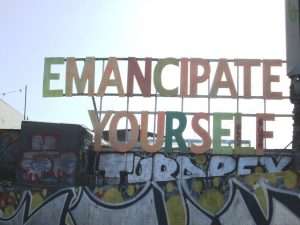“Great Lives”. a re-run of one of those BBC Radio series was on Radio 4 Extra this evening. The great life in focus was the mythological Robin Hood. The programme had been recorded against the background of last year’s British general election; the presenter declared it would not be appropriate to ask for which party Robin Hood would have voted, instead he asked would Robin Hood would have stood for parliament. The consensus was that parliament was not the sort of place that would have attracted Robin Hood, he was the sort of man who preferred direct action to parliamentary process.
Driving through persistent rain along muddy roads probably does not predispose one toward an optimistic disposition, but the idea that Robin Hood would engage in direct action aroused a sense of scepticism. “He should have been at the Shelton Bar seminar”, I thought, it is a thought that recurs every time the failure of democracy is considered.
Attending an Open University summer school in Sussex back in 1989, the final afternoon had been a workshop on industrial relations. The case of the closure of the British Steel works at Shelton Bar had been the background for a role play exercise. A group of us were cast as workers in the plant, which was efficient and productive, but scheduled for closure as part of a grander design of things. The workers were unable to do anything more to save the plant and so save the jobs. Reading through the script of the role play, there was the realisation that there was nothing that could be done; no form of words that could change the reality of the situation. When it came to our group’s turn, we set aside the script, climbed upon the desks and declared that we were engaged in direct action and that the plant was henceforth under workers’ control. The lecturer smiled, “a nice try,” he said, “unfortunately direct action doesn’t work.”
He had been right, of course. Every effort at direct action has failed, either immediately or a short time afterwards.
Direct action begs an answer to the question in Milan Kundera’s The Unbearable Lightness of Being, “Is it better to shout and thereby hasten the end, or to keep silent and gain thereby a slower death?” People undoubtedly prefer the latter, standing up and shouting does not come readily. But at least in direct action there is a sense of saying, “I am a person; I am alive; I have rights; I have dignity!”
Robin Hood may have engaged in direct action, for all the good it did him. A millennium later, the option would be no more effective than it might have been in medieval Nottingham.
